Running a small or mid-sized business isn’t easy. You’re juggling operations, customer service, finances, all while trying to grow. At some point, the tools you started with just can’t keep up. Off-the-shelf software often feels clunky, generic, and limited. Sound familiar?
Here’s the good news: you don’t have to settle.
Custom software isn’t just for big tech companies anymore. More and more. SMB automation is investing in tailored digital solutions, not as a luxury, but as a necessity. Why? Because custom software is built around your workflows, your goals, your way of working. It helps automate tasks, improve efficiency, and unlock real opportunities for growth.
Unlike generic software, a custom-built solution adapts as your business evolves. Whether it’s managing inventory, streamlining communication, or making smarter decisions through data insights, it’s designed to do the heavy lifting for you.
In this article, we’ll explore why custom software is a smart, strategic move for SMBs looking to scale, stay competitive, and work smarter, not harder.
Why SMBs Struggle with Growth & Efficiency
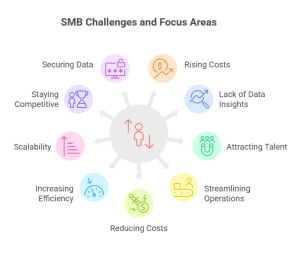
Running a small or mid-sized business isn’t for the faint of heart. Every day brings a fresh set of challenges, from juggling daily operations to planning for growth and the margin for error is razor-thin. Many SMB automation face growing pains that can feel impossible to overcome without the right tools. Let’s break down some of the biggest hurdles and how custom software can help solve them.
1. Rising Costs and Complexities
For most small and medium-sized businesses, staying profitable isn’t just a goal, it’s a day-to-day battle. Between payroll, rent, rising software fees, and unforeseen overheads, it’s easy for costs to spiral out of control. Unlike large corporations with generous buffers and financial cushions, SMBs often operate with razor-thin margins.
But it’s not just about cost. As your business grows, so does the complexity. You’re adding more customers, more products, more employees, and suddenly, the processes that once worked smoothly start to feel clunky. You might find yourself juggling outdated tools that don’t talk to each other, or hiring extra staff just to keep things running manually.
Custom software helps simplify all this. Instead of using five different platforms for HR, finance, inventory, CRM, and reporting, you can have one centralized system tailored for you. It automates the repetitive stuff, gives you a clearer view of what’s really happening across departments, and lets your team spend more time on what actually drives growth.
2. Lack of Data Insights
In the digital age, data is gold—but only if you know how to use it. One of the biggest pain points for SMBs is not having real-time, reliable insights. Maybe your sales team logs customer calls in a CRM, while inventory is tracked in Excel, and finance lives in a separate accounting system. With data spread out across silos, getting a big-picture view becomes a full-time job in itself.
What ends up happening? Decisions are made based on guesswork or outdated reports. Opportunities are missed. Costs creep up without explanation. And the business becomes reactive instead of proactive.
Custom software puts all your data in one place. Whether it’s a dashboard that shows your daily sales, a report that flags low-performing products, or predictive analytics that help you forecast demand—tailored solutions empower you with the insights you need to make confident, informed decisions, in real-time.
3. Attracting and Retaining Key Talent
Hiring is tough, especially when you’re a smaller business competing with the perks of big-name employers. Keeping good people? Even tougher. Today’s workforce values not just a paycheck but a seamless, engaging experience from hiring to onboarding to career development.
When your HR systems are clunky, slow, or overly manual, it’s easy for new hires to feel lost or frustrated. And let’s not even start on how long it can take to process timesheets, update employee data, or handle performance reviews if your tools aren’t keeping up.
Custom software changes the game by giving you a smarter, more efficient HR process. It can personalize the onboarding experience, track employee skills, suggest training paths, and even help you spot flight risks early. The result? You build a workplace where employees feel supported, valued, and excited to grow.
4. Streamlining Operations
Running a business shouldn’t feel like running ten different mini-businesses. But for many SMBs, that’s exactly what happens when sales, inventory, support, and accounting are all using different systems.
This lack of integration causes delays, errors, and frustration—not just for your team, but also your customers. Think of all the time wasted updating stock manually after every sale or trying to locate a customer’s order history across platforms.
With custom software, you can bring everything under one roof. A single, customized ERP (Enterprise Resource Planning) system can handle your inventory, track sales, manage vendors, and even keep tabs on customer interactions. That means fewer mistakes, smoother workflows, and faster service, all with less effort.
5. Reducing Costs
Let’s be real: custom software sounds expensive up front. But when you zoom out, the long-term ROI is hard to ignore. Most SMBs rely on multiple tools with different pricing models, monthly subscriptions, user licenses, add-ons, and the list goes on. It adds up fast.
Then there are hidden costs: the time your team spends doing manual work, the delays from software that doesn’t scale, and the money lost on mistakes or inefficiencies.
With a tailored solution, you’re investing in a tool that’s designed around your specific needs nothing more, nothing less. It reduces dependency on third-party services, cuts down on redundant labor, and minimizes the cost of training your team on multiple platforms. Over time, the savings speak for themselves.
6. Increasing Efficiency
In a growing business, time is your most valuable currency. When your processes are manual or clunky, they slow everything down whether it’s processing invoices, tracking leads, or managing customer requests.
Custom software allows you to automate the repetitive stuff. Need to send follow-up emails after a quote? It can do that. Want inventory levels to update automatically when a sale is made? Done. Need alerts when a customer hasn’t been contacted in a week? No problem.
This level of efficiency doesn’t just save time, it boosts morale. Your team gets to focus on meaningful work instead of babysitting spreadsheets. Customers get quicker responses. And your business runs smoother all around.
7. Scalability and Flexibility
When you first start out, a simple CRM or a couple of spreadsheets might do the trick. But as your business grows, your software should grow with you. Unfortunately, most off-the-shelf tools aren’t built for flexibility, they’re built for the masses.
That’s where custom solutions shine. You can start small, building the features you need most right now. Then, as you scale, add more users, expand to new markets, offer new services your software evolves with you. No more migrating to new platforms or cobbling together workarounds.
Custom software is built for your journey, not just your starting point.
8. Staying Competitive
In a world where technology evolves overnight, staying competitive means staying agile. Your competitors are automating, analyzing, and optimizing. If you’re stuck with outdated tools, you’re already a step behind.
Custom software gives you the edge. Whether it’s integrating with new tech, streamlining marketing, or offering personalized customer experiences, your business becomes more responsive, more innovative, and better positioned to seize opportunities.
And let’s face it, today’s customers expect convenience and speed. With the right tools, you deliver both while building a brand that feels modern, responsive, and future-ready.
9. Securing Data and Privacy
As you grow, your responsibility to protect customer data grows too. It’s not just about avoiding fines, it’s about trust. And when your systems are outdated or pieced together from multiple platforms, the risks multiply.
From potential breaches to compliance issues, data privacy can’t be an afterthought.
Custom software allows you to build security into the foundation of your business systems. Whether it’s role-based access, encrypted storage, audit logs, or regulatory compliance features you’re not relying on generic settings. You’re creating a secure environment tailored to your operations and your industry.
What Is Custom Software?
Custom software is a solution built just for your business. Instead of trying to fit your unique processes into a generic tool, custom software is designed to match your exact needs, your workflow, your data, your goals. It works the way you work.
Think of it like getting a tailored suit. Off-the-shelf software is like grabbing something off the rack, it might fit okay, but it’s never perfect. Custom software is stitched around the shape of your business, allowing it to run smoother, faster, and with fewer headaches.
Let’s say you run a retail store. Sure, a standard system might handle sales and inventory, but what if you want to automate reorders when stock is low? Or track a custom loyalty program? That’s where custom software shines, it adapts to your needs, not the other way around.
Why Custom Software Matters for Small Businesses
For small businesses, time and money are always in short supply. You’re constantly multitasking, managing customers, operations, finances, and team members. And when your software makes things harder instead of easier, it drains energy and efficiency fast.
That’s why custom software can be a real game changer. It’s not about adding more tools, it’s about creating the right tool, one that works exactly how you need it to.
Custom software becomes essential when:
- You’re using several apps that don’t talk to each other, and you’re stuck copying and pasting data between them.
- Your operations are too specific or complex for cookie-cutter solutions.
- You’re relying on Excel sheets or manual workarounds to get things done.
- Your current system is holding back growth or wasting employee time.
By building software that’s tailor-made to fit your business, you eliminate inefficiencies, automate repetitive tasks, and get back control. No more one-size-fits-all frustrations, just a system that feels like it was built with you in mind. Because it was.
Why Custom Software is a Game-Changer for SMBs
Small and medium-sized businesses (SMBs) face a unique set of challenges: tight budgets, multitasking teams, growing customer expectations, and an ever-evolving digital landscape. Off-the-shelf software can help, but only up to a point. When your business starts to outgrow its tools or you need more flexibility, custom software becomes the difference between keeping up and scaling up.
So, why should SMBs consider investing in custom-built software? Let’s break it down.
Key Benefits of Custom Software for SMBs

Automates Repetitive Tasks & Reduces Human Errors
One of the biggest time drains for SMBs is manual data entry—think payroll, invoicing, scheduling, and customer support. It’s not just tedious; it’s prone to human error.
Custom software eliminates the need for repetitive tasks by automating them. This means fewer mistakes in financial reports, faster HR processes, and a smoother experience for everyone involved.
Example: A retail business uses custom inventory software that automatically updates stock levels after every sale. The result? No more stockouts, over-ordering, or last-minute supplier scrambles.
Seamlessly Integrates with Existing Business Tools
Let’s be honest—most SMBs use a patchwork of tools. A CRM here, some spreadsheets there, maybe a separate system for accounting. Jumping between these platforms eats up time and leads to errors.
Custom software brings everything together—CRM, accounting, scheduling, inventory, marketing—into one streamlined platform that fits your specific workflow. No more switching tabs or copy-pasting data between apps.
Example: A service-based company integrates its custom CRM with automated scheduling, invoicing, and customer notifications. Everything flows smoothly, and staff spends less time chasing down information.
Enhances Customer Experience & Satisfaction
Today’s customers expect fast, frictionless service—and custom software helps you deliver exactly that. From instant booking confirmations to automated follow-ups, personalized communications, and timely support, custom solutions help you create memorable customer experiences.
Example: A local gym uses custom software to send automated membership renewal reminders, manage class bookings, and handle customer feedback, all without a single manual step.
Helps SMBs Scale Without Increasing Overhead Costs
Growth is a good problem to have but it comes with challenges. More customers, more orders, more inquiries… and often, more hiring. Unless, of course, your software is doing the heavy lifting.
Custom software is built to scale. It adapts as your business grows, handling increased workloads without requiring a bigger team.
Example: An eCommerce business uses custom software to automate shipping, manage inventory, and process payments allowing them to scale without constantly adding new staff.
Provides Actionable Business Insights in Real Time
Running a business without real-time data is like driving blindfolded. With custom dashboards and reporting tools, you can track what matters most: sales trends, customer behavior, employee performance, and more.
Bonus? AI-powered analytics can even help you predict future demand, optimize inventory, and spot hidden opportunities.
Example: A restaurant chain uses custom software to track dish sales in real time, adjusting menu pricing based on customer demand and time of day.
What Custom Software Actually Means
You might hear terms like “bespoke software” or “tailor-made solutions”, they all point to the same idea: software built from scratch (or highly customized) to suit one business’s specific needs.
Unlike mass-produced tools that are designed to serve as many users as possible, custom software focuses on you and your operations. It’s purpose-built for your workflows, your team, and your goals.
Why Do You Really Need Custom Software for Your SME?
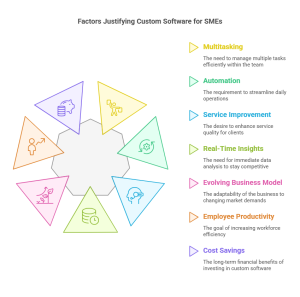
1. Your Team is Constantly Multitasking
Most SMBs ask their team to juggle a lot marketing one minute, operations the next. Custom software gives your staff the tools to multitask more efficiently by combining everything they need into one intuitive dashboard.
Instead of hopping between five systems, they get one centralized platform that does it all project management, reporting, communications, and more.
2. You Need to Automate Daily Operations
From data entry to payroll to scheduling, your team spends too much time on tasks that could easily be automated.
Custom software is designed to take the busywork off your plate so your employees can focus on what truly matters serving customers and growing the business.
3. You Want to Offer Better Services
Whether it’s online bookings, faster deliveries, or personalized product recommendations, customer expectations are higher than ever.
Custom software allows you to meet and exceed those expectations by giving your business the tools to offer seamless, personalized experiences every time.
4. You Need Real-Time Insights to Compete
In a competitive market, speed matters. You can’t afford to wait until the end of the month to know how your business is doing.
With custom software, you get real-time data at your fingertips from daily sales numbers to customer feedback so you can make smarter, faster decisions.
5. Your Business Model is Evolving
Maybe you’re expanding into new markets. Maybe you’re adding new services. Off-the-shelf software isn’t built for your unique growth journey.
Custom software adapts as you evolve. Whether you’re tweaking your pricing strategy, testing new offerings, or building new customer funnels, your software evolves with you no need to switch tools or start from scratch.
6. You Want to Boost Employee Productivity
Happy teams are productive teams. When your software supports their work, instead of getting in the way they can accomplish more, with less stress.
Custom tools like task managers, communication hubs, and workflow automations improve collaboration and reduce burnout.
7. You Want Long-Term Cost Savings
While custom software may require a higher upfront investment, the long-term return is clear. You save on subscription costs, reduce manual labor, avoid costly errors, and increase overall efficiency.
Instead of paying for features you don’t need (or missing ones you do), you get exactly what your business requires no more, no less.
Why should small and mid-sized businesses (SMBs) invest in custom software?
Every business is unique, and so are its challenges and goals. This is why off-the-shelf software often falls short. Custom software is specifically designed to meet the distinct needs of your business, allowing you to tailor it to your workflows, processes, and growth objectives.
For SMBs, investing in custom software isn’t just about adopting technology; it’s about streamlining operations so that you can focus on growth, enhancing customer experiences to build loyalty, and responding quickly to market shifts to stay ahead of competitors. It helps you automate repetitive tasks, reduce human error, and consolidate various systems into one seamless platform.
Custom software also provides flexibility, enabling your business to scale without the limitations of pre-packaged solutions. Whether it’s enhancing internal processes, offering personalized services, or improving data management, custom software directly aligns with your specific goals, giving you a competitive edge that off-the-shelf software simply can’t match.
By investing in a solution that’s built just for your business, you’re not only future-proofing your operations but also making a smart, long-term investment that grows with you as you scale.
How Can Businesses Ease the Transition to New Software?
Transitioning to new software can feel daunting, but with the right approach, it can be smooth and even exciting for your team. The key to a successful transition is open communication from the very beginning. When your team is informed about why the change is happening and how it benefits both them and the business, they’re far more likely to embrace it rather than resist it.
Start by involving your team early in the process. This means gathering feedback and involving them in the testing phase. Allowing your team to play a role in the software’s implementation can help them feel more invested and confident in the new system. By getting their input on user experience, functionality, and any potential issues, you can fine-tune the software to ensure it aligns with the team’s needs.
Training is another crucial step in making the transition smooth. Offering structured and ongoing training ensures that everyone knows how to use the new software effectively, whether it’s for everyday tasks or troubleshooting. Provide hands-on learning, easy-to-understand manuals, and, if possible, one-on-one sessions for those who need extra help.
But perhaps the most important aspect is understanding the “why” behind the software switch. Explain to your team how the new software will make their jobs easier, reduce frustrations, or increase efficiency. When people understand the long-term benefits, they’ll feel more invested in the process. It’s important to emphasize that the goal is to make work more efficient, not more difficult.
Throughout the entire process, keep an open door for feedback and be prepared to make adjustments based on your team’s experience. The transition will be smoother when employees feel supported, heard, and empowered to navigate the changes.
By prioritizing clear communication, active involvement, and thorough training, you can reduce resistance to change, boost morale, and make the switch to new software a positive experience for everyone.
Real-World Examples of Custom Software for SMBs
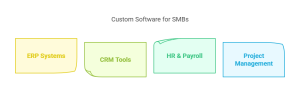
Here are a few types of custom software small and medium-sized businesses often benefit from:
1. ERP (Enterprise Resource Planning) Systems
An ERP system brings all your key operations under one roof, from inventory and accounting to procurement and beyond. For small businesses juggling multiple platforms, a custom ERP helps connect the dots and automate core tasks. The result? Fewer mistakes, better decisions, and more time saved.
2. CRM (Customer Relationship Management) Tools
Custom CRM software helps you manage every interaction with customers, from the first inquiry to ongoing support. You can track leads, organize sales pipelines, and even automate follow-ups. When tailored to your sales process, a CRM becomes more than a contact list, it becomes a growth engine.
3. HR & Payroll Software
Managing employees manually or through basic spreadsheets can lead to errors, delays, and compliance issues. A custom HR tool can track attendance, manage payroll, onboard new hires, and even handle benefits, all in one clean, simple dashboard made just for you.
4. Project Management Platforms
Have multiple projects running at once? A custom project management tool helps track deadlines, assign tasks, control budgets, and improve team collaboration, all tailored to your preferred way of working. No extra fluff. Just the tools your team needs to stay on track.
Real-World Use Cases of Custom Software in SMBs
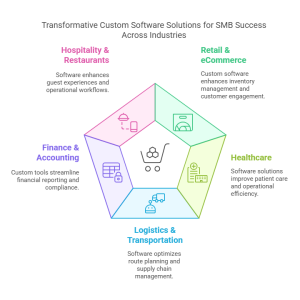
Custom software isn’t just a tech buzzword it’s a game-changer for small and medium businesses across industries. Let’s look at how different sectors are using tailored digital solutions to thrive:
Retail & eCommerce
Retailers are leveraging custom software to streamline everything from stock management to personalized marketing.
- Inventory Automation: Automatically updates stock levels as sales happen, reducing overstock or stockouts.
- Customer Loyalty Programs: Personalized discounts and rewards keep customers coming back.
- AI-Powered Recommendations: Helps boost sales by showing customers what they’re likely to love.
Healthcare
Managing appointments, billing, and patient data doesn’t have to be chaotic.
- Automated Scheduling: Patients can book online, and reminders go out automatically.
- Digital Billing: Ensures faster, more accurate payment processes.
- Electronic Health Records (EHRs): Access complete patient info in one secure place.
Logistics & Transportation
Efficiency and timing are everything in logistics.
- Fleet Tracking: Real-time GPS monitoring keeps routes optimized.
- Automated Dispatching: Assigns deliveries based on driver availability and location.
- Route Optimization: Reduces fuel costs and delivery times.
Finance & Accounting
Say goodbye to spreadsheets and hello to automated workflows.
- Automated Invoicing & Expense Tracking: Less manual work, more accuracy.
- Fraud Detection Tools: Monitor unusual patterns and flag them early.
- Client Portals: Give clients access to their financial data securely and on-demand.
Hospitality & Restaurants
Custom tools can transform the guest experience.
- Online Booking & Reservation Systems: Reduce no-shows and keep things organized.
- Point of Sale (POS) Integrations: Sync orders directly with inventory and kitchen.
- Order Automation: From mobile ordering to kitchen display screens, it’s all seamless.
How Custom Software Directly Impacts Revenue & Cost Savings
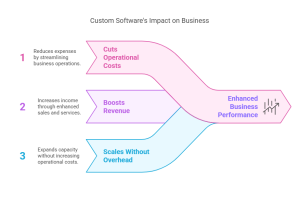
If you’re wondering whether the investment in custom software pays off, the answer is a resounding yes, and here’s why:
Cuts Operational Costs
Automating repetitive tasks reduces the need for extra staff and minimizes costly errors. Whether it’s payroll processing or order fulfillment, the time saved translates into real money.
Boosts Revenue
Efficiency improvements mean faster service, happier customers, and better reviews, all of which contribute to revenue growth. Plus, you’re not paying for features you don’t use.
Scales Without Overhead
As your business grows, your software grows with it. No need to hire a full IT team or constantly switch tools. One custom solution can support your expansion long-term.
Think of custom software as an investment in both peace of mind and profitability.
Steps to Getting Custom Software for Your Business
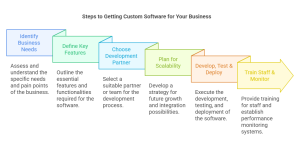
If you’ve never gone down this road before, don’t worry—it’s more straightforward than you think. Here’s your roadmap to a smooth custom software journey:
1. Identify Your Business Needs & Pain Points
Start by asking: What’s slowing us down? Whether it’s outdated tools, disconnected systems, or manual tasks, get clear on your bottlenecks.
2. Define Key Features & Functionalities
Think short-term wins and long-term scalability. Need automated billing? searching for a mobile app development company in dallas ? CRM integrations? List your must-haves and nice-to-haves.
3. Choose the Right Development Partner
Look for a team that understands SMBs, has industry-specific experience, and communicates clearly. They should get your vision and turn it into a smart, scalable solution.
4. Plan for Scalability & Future Integrations
Good software should evolve with your business. Plan for features that you might need 6 months or 2 years down the line.
5. Develop, Test & Deploy the Solution
Your partner will build and test the software before rolling it out. You should be involved in reviewing, giving feedback, and making sure it fits your workflows.
6. Train Staff & Monitor Performance
Once live, ensure your team knows how to use it. Gather feedback, track performance, and make updates as needed to get the most out of your investment.
Why Choose Us to Build Your Custom Software?

You’ve got a vision, and we’ve got the tools to bring it to life. Here’s why BitsWits is the partner you’ve been looking for:
SMB Automation Experts
We understand the unique challenges small businesses face, and we design solutions that solve them.
Industry-Proven Experience
From healthcare to eCommerce, we’ve built solutions that work in the real world, for businesses just like yours.
Tech-Forward, User-Centric
We specialize in integrating AI, automation, and cloud tech without making things complicated for your team.
No Fluff, Just Functionality
We build exactly what you need, no bloated features, no surprise costs.
Ongoing Support & Maintenance
We don’t disappear after launch. Our team is here to help you adapt, evolve, and optimize.
Ready to boost your operations and scale smarter?
Let’s build software that works the way your business does. Contact us today for a custom solution built to grow with you.
Claim Your Free Consultation Now!FAQs



















